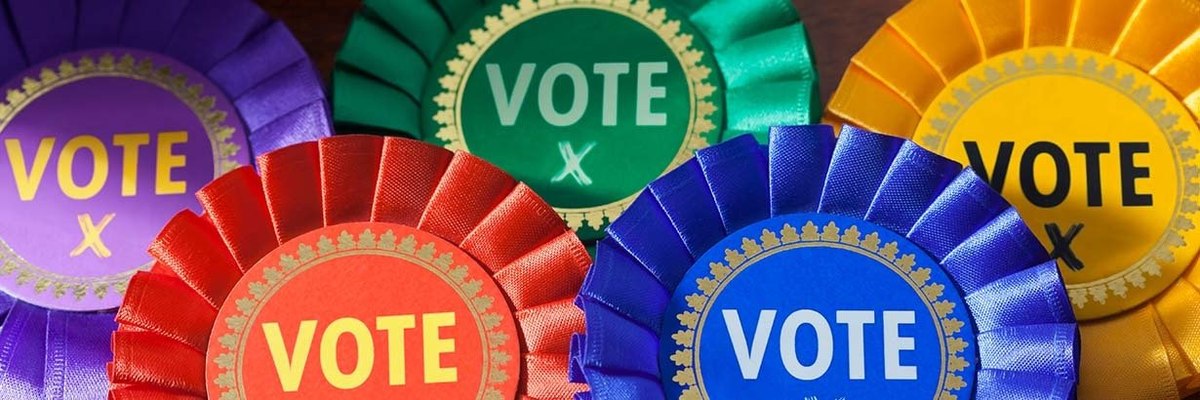While only 9% of Britons think British politics would be better off without smaller parties, they are unsure of the consequences of multi-partyism
The 2024 general election was the most multi-party in British history. While we’ve not quite reached the levels seen in countries like the Netherlands or Denmark, the share of the vote won by the two largest parties fell to its lowest level ever (57%), while rising to all-time highs were the number of parties winning more than 5% of the vote (five) and the number of parties winning multiple seats (eleven).
This follows substantial gains by smaller parties and independents in the last few local elections, with this rise in multi-partyism having the potential to reshape British politics in quite major ways. Not only are a more diverse array of parties represented in parliament, but the more seats being won by parties other than the main two increases the chances of hung parliaments – and thus coalitions – in future general elections.
On the face of it, the British public are broadly receptive to such an increase in multi-partyism. Only one in eleven (9%) believe that the British political system would be better off if – as per the US – there were only two parties were represented in parliament, while a majority (52%) believe it would be worse off if we went what is in effect fully American.
While supporters of smaller parties naturally think British politics would be worse off without them – 70% of Lib Dems and 63% of Reform UK voters believing so – support for a ‘pure’ two-party system isn’t particularly apparent even among those who voted for the two traditionally largest parties – only one in eight Conservatives (12%) and 6% of Labour voters believe politics would be better if, implicitly, the pair of them had sole control of the Commons.
Similarly, the British public clearly favour (62%) the idea that, regardless of whether your preferred party can win in your seat, you should vote for the party you like most. Only 22% of Britons say that it is important to vote for a party that can realistically win the seat, even if they aren’t necessarily your first choice.
This actually has less of a big-small party supporter split to it, instead more of a divide between supporters of the left and right parties. Only 13% of Conservatives and just 7% of Reform UK voters think a party’s chances of winning should override whether they are your first choice. For Labour and Lib Dem voters, though, the figure is closer to four in ten (38-39%), something not surprising when considering their higher likelihood of tactical voting, with the more longstanding existence of viable alternatives on the left also a potential factor.
What’s in a main?
But regardless of Britons being open to the existence and even representation of more parties, they are still in many respects wedded to a somewhat two-party mindset. There continues to be consensus that the Conservatives (85%) and Labour (93%) are ‘main parties’, but far fewer say the same of the smaller parties.
Of the less traditionally major parties, only the Lib Dems are regarded as a ‘main’ party by a substantial portion of the public – exactly half (50%) putting them in the same bracket as the Conservatives and Labour, though four in ten (41%) disagree. Only one in nine Britons (11%) consider the ‘main’ label to fit the Greens, with just one in five (19%) believing Reform sit in that category, no more than think the same of the SNP (22%), a party that contests less than one in ten seats in a general election.
Unsurprisingly, there is an element of political alignment to this. Three quarters of Lib Dem voters (76%) consider their party to be a ‘main’ party, with two-thirds of Labour supporters (67%) agreeing, compared to only four in ten Conservatives (41%) and three in ten Reform UK voters (30%). By the same token, nearly two-thirds of Reform voters (63%) consider their own party to be in the ‘main’ category, although only 11% of Lib Dem voters share this view of Farage’s party.
But alignment has limits. Even among more ideologically similar Conservatives, only one in five (21%) consider Reform a top-tier party, with only one in six Labour voters (17%) likewise considering the Greens to have reached ‘main’ party status.
Compared to when this question was asked in 2016, the Lib Dems have had a clear bump in status – back then, when the party had won only 8 MPs in the most recent election, only 33% believed the party sat in the ‘main’ category, 17 points lower than today. By contrast, the SNP have fallen in the eyes of the public – 36% felt they were a ‘main’ party in 2016, 14 points more than today. The relative seat change and exchange of the third party status between the SNP and the Lib Dems has likely played a part in these shifts.
Perhaps more perplexingly, fewer Britons (19%) perceive Reform UK as a ‘main’ party today than felt the same about UKIP in 2016 (26%), despite Reform winning more votes and more seats in the 2024 election than UKIP did in the 2015 election.
While there are undoubtedly quibbles around what defines a main party, a major party, a significant party and many other formal and informal categorisations of political parties, it demonstrates a clear distinction in the public mind between the Conservatives and Labour on one side of a line, the newer parties on the other, with the Lib Dems currently somewhere in between.
Building a coalition?
On top of this, Britons still express a preference for single-party over coalition government, a likely consequence of greater multi-partyism. Four in ten (41%) say they feel the current norm of one party holding a majority of seats is better, while only a third (34%) believe that multi-party government would be superior.
It is unsurprising that Conservative and Labour voters are more likely to favour single-party government, but it’s not entirely as clear-cut as that. While 57% of Conservatives and half of Labour voters (50%) prefer one party to hold a majority of seats, three in ten voters from both parties (28-31%) view coalitions as preferable. By contrast, while 41% of both Lib Dem and Reform voters do indeed favour coalitions, a similar number (41-43%) view one party winning a majority as a better outcome of an election.
Regardless of whether the public want coalitions, it’s not unforeseeable that they could be required at a future election. However, not all potential coalitions would be created equal, with the public more likely to think that certain parties would be able to make a positive contribution to any multi-party government.
Just shy of half of Britons (49%) believe the Lib Dems would be a good addition to a coalition, with three in ten (30%) feeling they would not. The public are slightly more sceptical about the Greens, but 45% still believe they would make a positive contribution. With Reform UK, though, just a quarter of Britons (26%) think they would be a plus, 57% instead believing their participation in a coalition would not be positive.
Nine in ten Reform UK voters (89%) believe they would make a positive contribution on a coalition, but they might struggle to find partners – no more than one in ten Labour or Lib Dem voters (8-10%) agree, while just 38% of Conservatives believe Reform could be a positive influence, against 47% who disagree.
The Lib Dems, by contrast, have options. Beyond the 91% of Lib Dem voters who feel they could be a positive influence, nearly two-thirds of Labour voters (64%) concur, with Conservative voters roughly evenly split 44% to 42%. The idea that the Greens might play a positive role in government gains the overwhelming support of Labour and Lib Dem voters (64-69%), but is only believed by a quarter of Conservatives (25%) and one in five Reform voters (20%).
How do you feel about Britain’s growing array of political parties, politics in general, and everything else? Have your say, join the YouGov panel, and get paid to share your thoughts. Sign up here.
Photo: Getty










